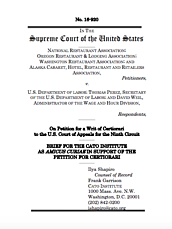Yet the modern administrative state has been allowed to evade many of the Constitution’s structural protections for liberty. It has become what some have called the “fourth branch of government,” combining all three functions — legislative, executive, and judicial — into one body that does not have to jump through the Framers’ hoops. National Restaurant Association v. Department of Labor is a prime example of how far down the rabbit hole we have come from the Framers’ original vision.
In 2010, the U.S. Court of Appeals for the Ninth Circuit ruled that a section 203(m) of the Fair Labor Standards Act (FLSA) did not prevent employers from instituting a policy of tip-pooling (redistributing tips from individual employees to other workers) when the employer did not take a tip-credit (where the employer uses an employee’s tips to satisfy the FLSA’s minimum-wage requirement). The court held that the statute’s “plain meaning” did not explicitly forbid this practice, so it was legal.
The Department of Labor (DOL) didn’t like the court’s opinion, however, and in 2011 conducted a “rulemaking” that would reinterpret the FLSA to say that tip-pooling was illegal in certain situations — even when the employer didn’t take a tip-credit. The National Restaurant Association and several other groups challenged the rulemaking, arguing that an executive agency can’t ignore federal-court precedent and unilaterally rewrite a statute that is unambiguous. The district court agreed and quickly struck down the rulemaking. But the Ninth Circuit ignored its own 2010 precedent and upheld the DOL’s new statutory interpretation.
Undeterred, the groups sought en banc review (where all of the judges in the circuit rehear a case), but — over a strongly worded dissent, calling the circuit court’s reasoning “entirely alien to our system of laws” — the court declined the request. Cato has now filed an amicus brief supporting the National Restaurant Association’s petition for Supreme Court review.
We argue the circuit court’s opinion raises serious separation-of-powers concerns by allowing the DOL to exercise legislative power when it essentially rewrote an unambiguous FLSA provision. Moreover, upholding the new DOL regulation effectively overturned a federal court’s precedent in direct circumvention of the judicial branch’s duty to “say what the law is.” The Court should take this case and show that the Constitution’s separation of powers does not allow such judicial enabling of executive mischief. Administrative agencies simply cannot take it upon themselves to ignore or rewrite the law.



